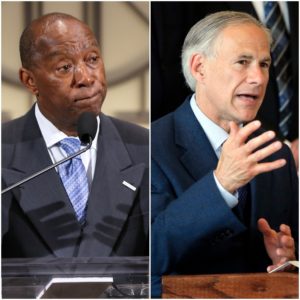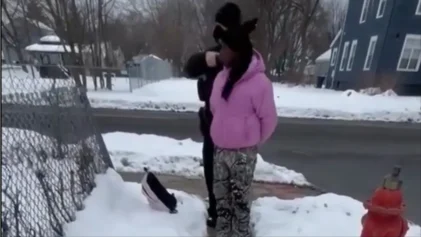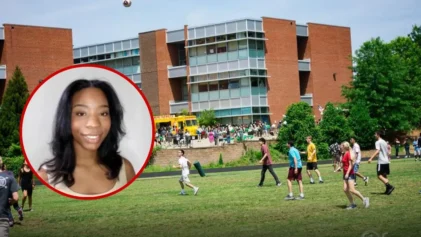
Texas Mayor Turner (left), Governor Abbott (Right)
AUSTIN, Texas (AP) — Harvey’s devastation is testing two Texas leaders whose personal styles are as divergent as their politics.
Houston Democratic Mayor Sylvester Turner is a former longtime state lawmaker who made a career of impassioned defenses of liberal legislation that had no hope of passing the GOP-controlled Legislature. Republican Gov. Greg Abbott sets the agenda in his deep red state using a measured, lawyerly demeanor.
The two already have clashed over conflicting instructions on whether to evacuate Houston ahead of Harvey’s deadly floods, and there could be more tension coming. It underscores the rift between Texas’ big cities, which are almost all Democrat-run, and the Republican-dominated Legislature and statewide offices.
Still, Turner and Abbott will have to work together, along with the Trump administration, to recover from the heaviest tropical downpour in U.S. history — despite deep ideological differences.
“Adverse circumstances always bring out true nature — and the more severe, the truer the nature,” said Bill Miller, a veteran Texas political consultant who has worked for Democrats and Republicans.
Abbott uncharacteristically seized the spotlight last week as Harvey was nearing his state’s Gulf Coast. He said Houston residents “should strongly consider evacuating” even if not told to do so by local officials: “You have the power and the ability to avoid being stuck into a search and rescue situation.”
Turner and Republican Harris County Judge Ed Emmett responded that Harvey wasn’t forecast to hit Houston directly and urged people to ride out the storm at home. After Hurricane Rita in 2005, evacuation orders came too late and millions of people clogged highways at once, snarling traffic and contributing to 100-plus deaths.
“There is no need, at this point, for people to be thinking about leaving, getting on the road, putting themselves in greater danger,” Turner said. Added Emmett, whose county encompasses Houston: “We are not talking about a hurricane in Houston. We are talking about a rain event.”
Now, with the death toll from floods still rising and the kind of water rescues Abbott warned of chillingly commonplace, the governor isn’t pointing fingers, saying, “Now is not the time to second-guess.” Turner has repeatedly defended his pre-storm advice saying mass evacuation would have been “a nightmare.”
Who will ultimately be proven right could depend on Harvey’s final Houston death toll. But the incident shows how decisions can drive political perception, even when everyone’s ultimate goal is to save lives.
Harvey response offers a chance for Abbott, now seeking re-election in 2018, to recover from a string of political defeats. He called the Legislature into special session in July to approve a “bathroom bill” targeting transgender people, school vouchers and property tax cuts — but got none of those. The governor also hoped to curb urban power, backing largely unsuccessful legislation to cap city and county spending and even limit municipal tree ordinances.
Mark Jones, a political science professor at Rice University in Houston, said the divide between Texas’ liberal cities and conservative state government “was never sharper.”
“In the short term, the catastrophe suffered by the Houston area will be an antidote to the extreme partisan politics,” Jones said. “The more difficult time will come in the months ahead, when feuds begin to emerge over the timing of payments and the pace of the recovery effort.”
Turner, 62, is a Houston native and the city’s second black mayor. A Harvard-trained lawyer, Turner spent 26 years in the Texas House and was famous for mesmerizing oratories that often failed to win over his Republican colleagues and bringing an abacus onto the floor to mockingly count out GOP-backed spending cuts.
Narrowly elected mayor in December 2015 after unsuccessful runs in 1991 and 2003, Turner was perhaps best known prior to Harvey for his comments after flooding in April 2016 killed eight people. Turner said then, “A lot of rain coming in a very short period of time, there’s nothing you can do” and, “We certainly can’t control the weather.”
They were the kind of offhand but potentially problematic remarks that staid cautious Abbott almost never makes.
A Vanderbilt Law School graduate, Abbott was an ambitious 26-year-old when he went jogging in 1984 in Houston and a 75-foot oak tree fell on him, crushing his spine and leaving him paralyzed from the waist down. What made the tree fall was unclear, though it might have been weakened by Hurricane Alicia the previous year.
Abbott, now 59, served on the Texas Supreme Court and was state attorney general before being elected governor in 2014. In his previous post, Abbott boasted of suing the Obama administration 30 times on everything from the federal health care law to environmental regulations. But he’s graded the federal response to Harvey under Trump an “A+.”
The governor also believes the science of climate change is still unsettled while Turner is a co-chairman of Climate Mayors, city leaders vowing to meet the goals set by the United Nations Paris Climate agreement after Trump withdrew the U.S. from it.
With the world watching post-Harvey, the political stakes will be sky high for both Turner and Abbott.
“You have to have a plan and execute it,” Miller said. “If not, it gets noticed quick.”


